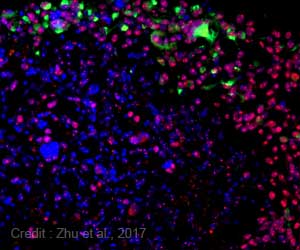Chloroquine may limit zika virus transmission from mother to fetus, found a new study. Zika virus remains a major global health risk.
Highlights
- Chloroquine, the antimalarial drug may also be effective for zika virus treatment
- Chloroquine, has a long history of safe use during pregnancy and is quite inexpensive
- Decreased amount of zika virus was found in maternal blood and fetal brain
Terskikh is a co-senior author of a new study that examined the effect of chloroquine in human brain organoids and pregnant mice infected with the virus and found the drug markedly reduced the amount of Zika virus in maternal blood and neural progenitor cells in the fetal brain. Pregnant mice received chloroquine through drinking water in dosages equivalent to acceptable levels used in humans.
"Our research is the first to study Zika infection in a mouse model that transmits the virus in a way similar to humans," explains Alysson R. Muotri, Ph.D., professor, and director of the Stem Cell Program at UC San Diego and co-senior author of the study.
"Until now, researchers used a mouse strain that is deficient in interferon--a signaling protein that heightens anti-viral defenses. Those mice actually die from Zika infection, making it difficult to study the natural transmission of the virus from father and mother to fetus and to assess the effect of this transmission on the newborns."
"We believe our mouse model more accurately represents the way Zika virus infects men, women, and babies while in the womb," adds Terskikh. "Although chloroquine didn't completely clear Zika from infected mice it did reduce the viral load, suggesting it could limit the neurological damage found in newborns infected by the virus."
"Chloroquine has a long history of successfully treating malaria, and there are no reports of it causing birth defects," says Terskikh. "Additional studies are certainly needed to determine the precise details of how it works. But given its low cost, availability and safety history further study in a clinical trial to test its effectiveness against Zika virus in humans is merited."
- Sergey A. Shiryaev, Pinar Mesci, Antonella Pinto, Isabella Fernandes, Nicholas Sheets, Sujan Shresta, Chen Farhy, Chun-Teng Huang, Alex Y. Strongin, Alysson R. Muotri & Alexey V. Terskikh. Repurposing of the anti-malaria drug chloroquine for Zika Virus treatment and prophylaxis, Scientific Reports (2017).doi:10.1038/s41598-017-15467-6
Source-Eurekalert














